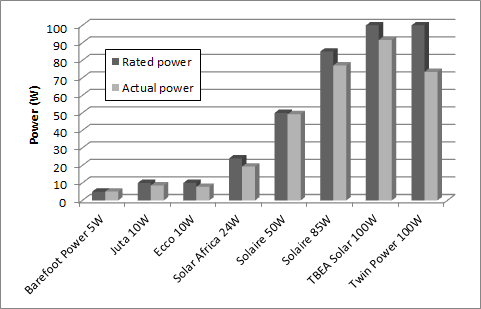*Nerd alert*
When I came to Malawi, I repeatedly experienced people talking about the problem of low-quality products on the market for solar lights and solar energy in general. Innocent as I were at that time, I assumed that it could not be so bad. Everywhere you find low-quality products, but the good thing is that they are cheaper, so in the end it might be adviseable to buy the low-quality product.
When I came to Malawi, I repeatedly experienced people talking about the problem of low-quality products on the market for solar lights and solar energy in general. Innocent as I were at that time, I assumed that it could not be so bad. Everywhere you find low-quality products, but the good thing is that they are cheaper, so in the end it might be adviseable to buy the low-quality product.
To have power in a house in the middle of nowhere in Malawi, you need basically two things: A solar panel and a battery (+ some more things, but let's keep it simple). Before I came to Malawi, I assumed that this world was straight forward - a solar panel is a solar panel, and a battery is a battery. To make life even easier, the solar panels and batteries have numbers on them that tell how much power they can produce or how much energy they can store.
How to power your offgrid home in Malawi...
Anyway, I went to my new existence in Malawi carrying my experimentalist background, and soon started to test different solar panels to see if they performed well. I just did simple measurements with a general multimeter and the sun as the light source, and I soon discovered that the power of the solar panel that was written on the back of it not always was in agreement with the actual power. I acknowledge that my measurements were not 100% accurate, but with some reasonable assumptions and simplifications, I found that the power of some of the panels was as low as 70% of the rated power. I imagine it would be difficult to sell Coca-Cola bottles that are 70% full, but with solar panels it's not so straight forward to see, so they sell anyway.
Performance of a few selected panel sizes and brands available in Malawi.
I knew quite a bit about solar panels before getting here, but not as much about batteries. Since I did not know so much, I was even more naive about the batteries. It took me a while before my experimentalist drive made me also start testing batteries. That was, however, even more shocking. Many of the batteries appeared to have a capacity of only 30% of what was claimed on the information printed on them. I could not believe my own measurements, but after spending a few weekends recording battery voltages every hour I was quite sure about what I had found. No-one would ever go back to a gas station that filled your tank 30% up and charged you for full tank? But since almost no-one ever bother to measure the capacity of a battery, people are beeing ripped off every day like this.
Actual battery capacity for a few different brands of small household batteries available in Malawi. The ones that perform well are hard to find...
Battery discharging: voltage as a function of time when discharging small household batteries at a current of 0.32A. The battery is empty at 11.5V - after less than five hours for the worst batteries, whereas the best can last for about twenty.
It seems that products that have failed quality control or something are the products that reach Malawi. The prices are low, but not low enough to justify the performance.
Simple tools in my improvised lab - but much can be done with a multimeter and a few bulbs!
I am also testing solar light bulbs for battery operation. The salespeople in the shops are totally amazed when I come with my multimeter to test the actual power consumption of the bulbs they are selling, and look at me as if I was a sort of magician. Last time I was checking I found that a certain bulb was rated 3W according to the box, on the bulb itself it was written 1W, but measuring I found that the power consumption was actually 8W.
If anyone interested solar energy in Malawi ever reads this, take note: Be very careful when you purchase products, especially batteries. The brand ECCO is the worst, but unfortunately also the most popular - it is the cheapest.






No comments:
Post a Comment